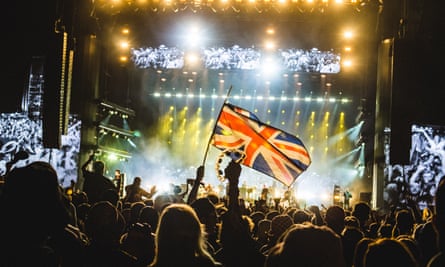Industry professionals are urging concert arenas to add an extra £1 charge to concert tickets in order to establish a financial resource that will support grassroots live music. According to these experts, increasing expenses are leading to a difficult situation for smaller venues.
The DCMS committee received testimony from promoters, artists, and industry representatives, with almost all in agreement that a levy should be implemented on tickets. The funds from the levy would be distributed to smaller venues, 125 of which were forced to close in 2023.
Mark Davyd, the head of Music Venue Trust, proposed a model similar to that of France, where there is a pooled sum of approximately €200m (£172m) available for venues, artists, and promoters to request, financed through a fee on the overall value of tickets sold at major venues.
Since December 2023, MVT has been advocating for a tax to be implemented, following the permanent closure of the beloved small venue, Moles in Bath, along with approximately 16% of grassroots spaces in 2023.
The recommendation from MVT was to establish a charitable organization to oversee the fund. This organization would have a board consisting of individuals from the industry instead of being managed by the government.
On Tuesday, the MVT shared a picture of the lineup for this year’s Leeds and Reading festivals, excluding artists who originated from smaller, local venues. Only five performers were included.
According to the Music Venue Trust’s yearly report released in January, approximately 38% of grassroots venues in the UK suffered a financial loss. Despite a higher demand for tickets, the entire sector only saw a small 0.5% profit margin.
There were different perspectives on who should cover the £1 charge – individuals purchasing tickets, who are already subject to booking fees, or the arena venues themselves.
According to John Drury, the head of the National Arenas Association, implementing a £1 charge on arenas would result in a decrease of approximately 20% in our profits.
Drury told the committee that the “Enter Shikari model” – the band that donated £1 from every ticket sold to their OVO Arena Wembley show in February 2024 – would be the NAA members’ favoured approach to relieving pressure on grassroots venues.

Kwame Kwaten, the vice-chair of the Music Managers Forum, expressed the need for the levy on arena ticket sales to be made compulsory, rather than being optional. He stated that if given the option, people are more likely to back away, unlike Enter Shikari who are known for their generosity.
Several other individuals recommended implementing a fan-based review system for grassroots music that resembles the one used in English football. There were also suggestions to lower the current 20% value-added tax (VAT) on tickets, as it is significantly greater than those in France, Italy, or Germany.
Members of Parliament were also informed that smaller establishments are facing growing challenges due to planning requests and complaints about noise. One specific example brought up was the Night & Day cafe in Manchester’s Northern Quarter. The venue was threatened with potential closure after a resident, whose flat is next to the cafe, made numerous complaints.
Davyd stated that the Northern Quarter, a popular cultural area, has been labeled as a “mixed-use” space, potentially jeopardizing the existence of 14 other music venues in Manchester due to possible complaints from residents.
According to Jon Collins, the CEO of Live, the organization representing the live music and entertainment sector, there are similar worries about the Baltic Triangle in Liverpool. This is due to the fact that housing developments are being constructed in close proximity to music venues.
He expressed concerns about the “agent of change” concept, which suggests that new developments should accommodate the needs of existing businesses in the vicinity, such as covering the costs of soundproofing. However, he believes that this principle is currently ineffective and does not adequately safeguard live music venues.
The speaker stated that while the idea of ‘agent of change’ is appreciated, there is a need for it to have more power as there are already venues in the Baltic Triangle facing challenges.
In MVT, Davyd mentioned that approximately half of the cases involve financial difficulties, while another 20% pertain to planning and development matters.
On the same day that a study by the British Academy warns of the potential global threats that could harm live performing arts, there are also concerns about the vulnerability of small venues. The Academy suggests that unless these arts become more resilient, they could face an existential threat.
The study, which examined how the Covid-19 pandemic has affected the performing arts industry, stated the necessity of a well-defined resilience plan supported by both national and local governments.
Source: theguardian.com


